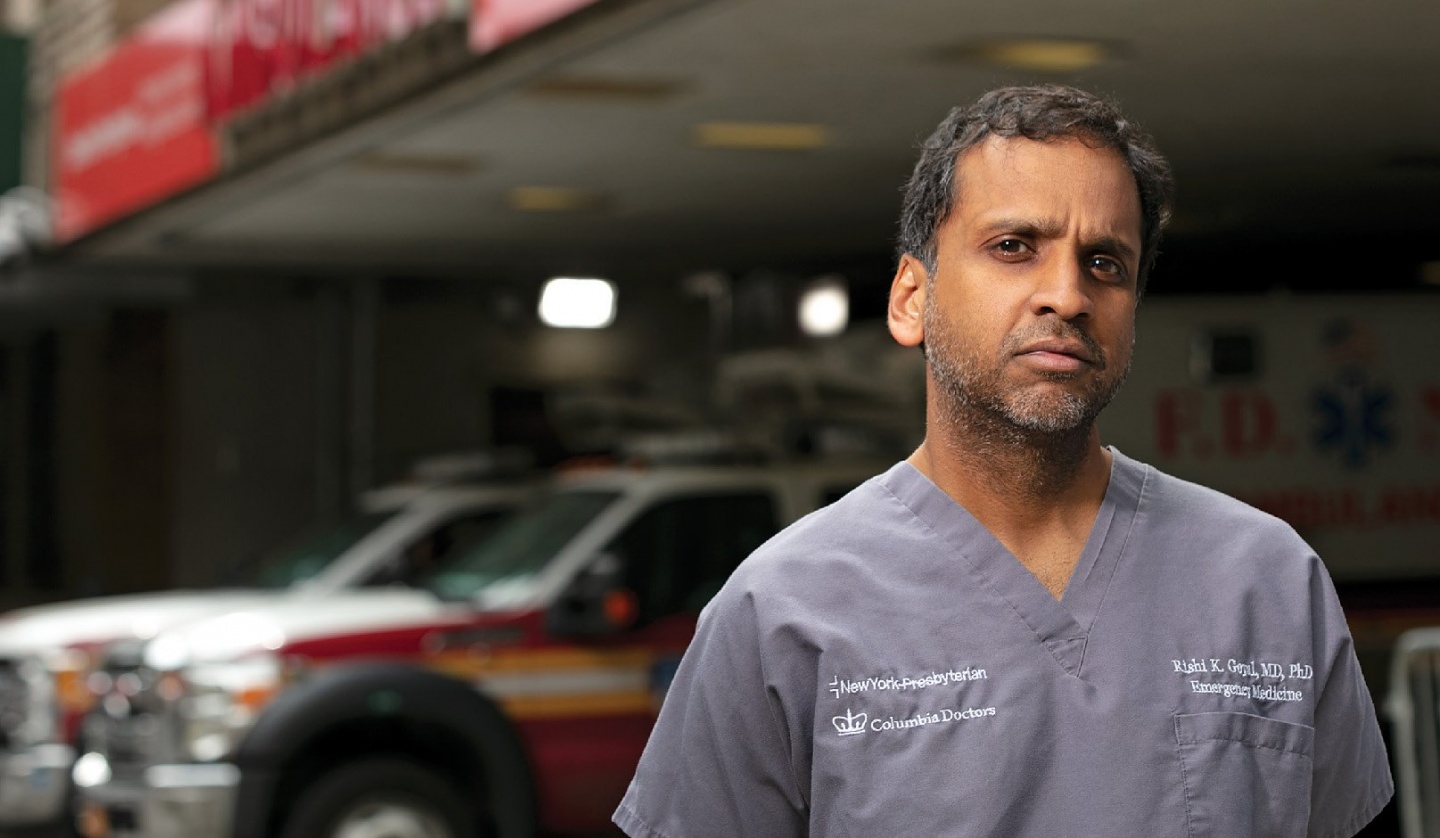Dr. Rishi Goyal PS’01, GSAS’10 is spearheading a Columbia World Project aimed at understanding the reasons for Covid vaccine reluctance.
Columbia College | Columbia University in the City of New York
Dr. Rishi Goyal PS’01, GSAS’10 is spearheading a Columbia World Project aimed at understanding the reasons for Covid vaccine reluctance.

JÖRG MEYER
As the United States moves into its second pandemic summer, vaccine hesitancy looms as one of the biggest hurdles to achieving herd immunity from Covid-19. While the numbers are a moving target, as of late April, a CBS News Poll found that roughly four in 10 Americans were either undecided about the vaccine or refused it outright. Yet when Dr. Rishi Goyal PS’01, GSAS’10, an emergency room physician and assistant professor of emergency medicine at the Columbia University Medical Center, discusses the issue, what’s most striking is the empathy he has for the reluctant.
“Public health figures often see it as obvious,” Goyal says. “‘Get the vaccine; it’s good for you, it’s good for everyone. You need more information? Here’s a bunch of safety stuff.’ But none of that moves the needle. If somebody tells you they’re worried there’s a microchip in the vaccine, how are you supposed to engage with the person? That’s complicated. You could disrespect them or assume they don’t know what they’re talking about, but that’s not going to get you anywhere. There has to be dialoguing that takes seriously people’s concerns.”
Goyal is currently spearheading a Columbia World Project aimed at understanding the reasons for — and ultimately developing custom messaging to address — Covid vaccine reluctance. Co-led by Dennis Yi Tenen, a former Microsoft engineer and an associate professor of English and comparative literature, digital humanities and new media studies at Columbia, the project combines large-scale data science research with language analysis.
“Too many people assume that there’s one way of managing all vaccine hesitancy,” Goyal says. “Some people’s reasons are ideological; some object on religious grounds. Others are worried about the history of racial injustice. Or safety issues and the autism argument that started in the early 20th century. But there has to be an understanding that a lot of people are being left out of the advances of modernity, and are not gaining the benefits of the modern world.”
Goyal has made a career practice of considering multiple perspectives — and significantly, other people’s perspectives — when it comes to medical matters. Collaboration and interdisciplinarity are at the heart of his Columbia World Project research; he also brings that ethos to bear as the director of medical humanities, the College’s newest major. The program explores the reciprocal relationship between health and culture with a focus, he says, “on issues around social justice, marginalized communities [and] communities that have been left out of certain aspects of mainstream science because of its racist and sexist history.”
The timing for the major’s arrival (it earned its status in November after nine years as an academic track) isn’t lost on Goyal. After more than a year spent coping with the pandemic, it’s all too easy to point to examples of issues that the program explores — from making sense of the rise in anti-Asian animus, to understanding why social factors have mattered more than biological factors when it comes to the severity of disease. “I wish we weren’t living through this, but it does solidify the logic of having the major,” Goyal says. “A lot of people who go into healthcare fields — not just doctors and nurses, but also people who are in pharmaceuticals, who design healthcare systems, who promote insurance plans — think about the work as technical work, but not in terms of what it really is, which is care work.”
Goyal was born in Brooklyn just a few months after his parents moved from India, and he spent most of his childhood summers there. He says he’s always been an avid reader (from youthful favorites like The Phantom Tollbooth and Harriet the Spy, he quickly graduated to Fitzgerald and Hemingway — “then I was off to the races”). After graduating from Dartmouth he traveled a winding path, from P&S to GSAS’s Ph.D. program in English and comparative literature, and back again.
“I wanted to develop my ability to think with, and through, novels,” he says. “I’ve always found that when we engage with literary texts, we come closer to understanding our own minds, emotions and motivations, while also encountering the possibility of other minds.”
Thinking through novels is precisely what he did this past spring, with his undergraduate and graduate seminar “Utopia and the Pandemic.” “A Marxist critic wrote something like, ‘The post-catastrophe situation is the moment for the emergence of utopia,’” Goyal says. “I wanted to take that quote seriously, to say, ‘This [pandemic] was a disaster on every level. How do we use the imagination to think about undoing all of these social ills, all of these structural disparities, all of the systemic racism and misogyny, all of the colonial leftovers? Can we even reimagine a place like New York City, or any city, as potentially utopic?’ And how can we turn to literary texts to inform that?”
Goyal, who says he met “the love of my life” during his medical residency, has two children: a son, 12 (currently into Tom Sawyer), and daughter, 8 (with whom he’s enjoying Tove Jansson’s Moomin novels). He laughs at the notion of spare time, but loves to cook and sketches a bit. He’s also biking and running more these days. And, he says, “I’m always reading.”

Published three times a year by Columbia College for alumni, students, faculty, parents and friends.
Columbia Alumni Center
622 W. 113th St., MC 4530, 6th Fl.
New York, NY 10025
212-851-7852
cct@columbia.edu

Columbia Alumni Center
622 W. 113th St., MC 4530, 4th Fl.
New York, NY 10025
212-851-7488
ccalumni@columbia.edu